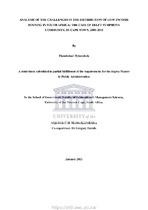Analysis of the challenges in the distribution of low-income housing in South Africa: The case of Delft Symphony Community, in Cape Town, 2000-2015
Abstract
There is a major urban housing crisis in South Africa expressing itself in the failure of the government to provide low-income housing to urban residents. Considering this crisis, the specific purpose of this study was to examine the challenges to effective distribution of low-income housing with specific reference to the Delft Symphony community, focussing on the epoch from the years 2000-2015. The study was motivated by the fact that while there is an abundance of research conducted in the Cape flats, research focusing on the Delft Symphony community (DS community) is scanty especially on low-income housing distribution. This research gap became the focus of this thesis. To understand the challenges to effective distribution of low-income housing, this study was grounded in two theories namely the theory of justice and the self-help housing theory. The study employed qualitative methods in which semi-structured and in-depth interviews were conducted to collect the necessary data. This research used twenty-eight (28) key informants, and these were selected through snowball and stratified samplings. Qualitative data were analysed using content and thematic analysis. The findings revealed that government internal bureaucratic procedures and due processes such as the land approval process seem to contribute to the sluggish distribution of low-income housing in the DS community. The study also found that the low-income housing processes in the DS community are seemingly driven by politics manifesting in the allocation of houses based on political affiliations. The main recommendation from this study is that to improve the distribution of low-income housing, there is a need for the government to revitalise transparency and reduce bureaucratic delays in the processes of low-income housing.

